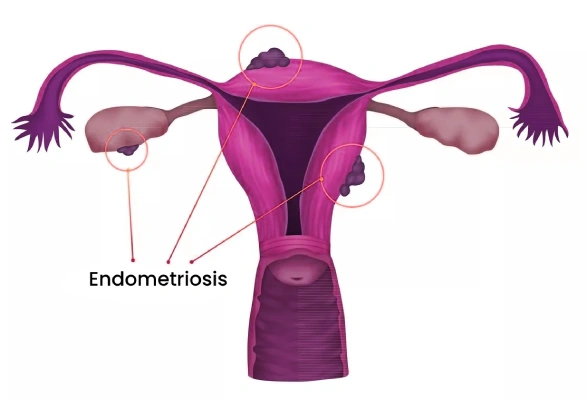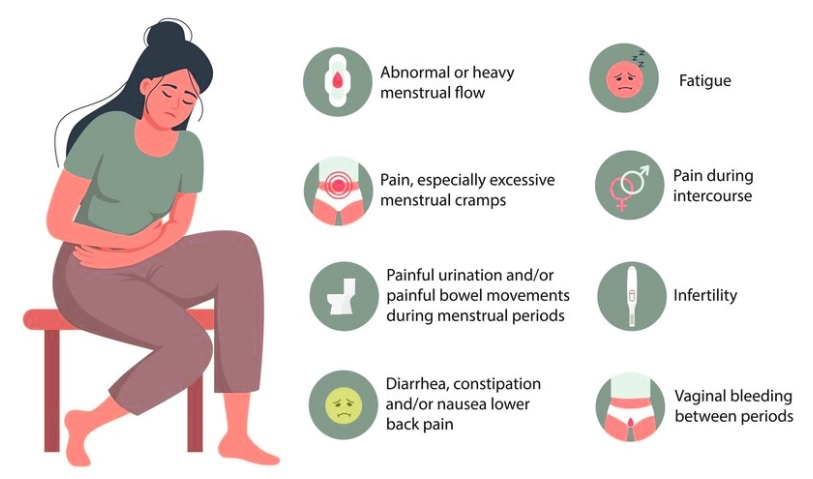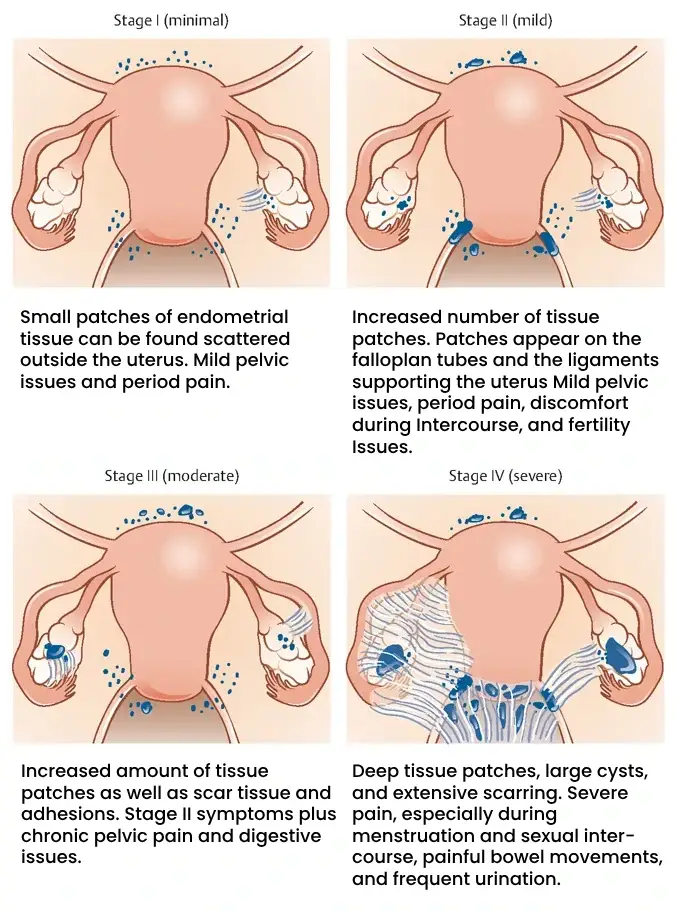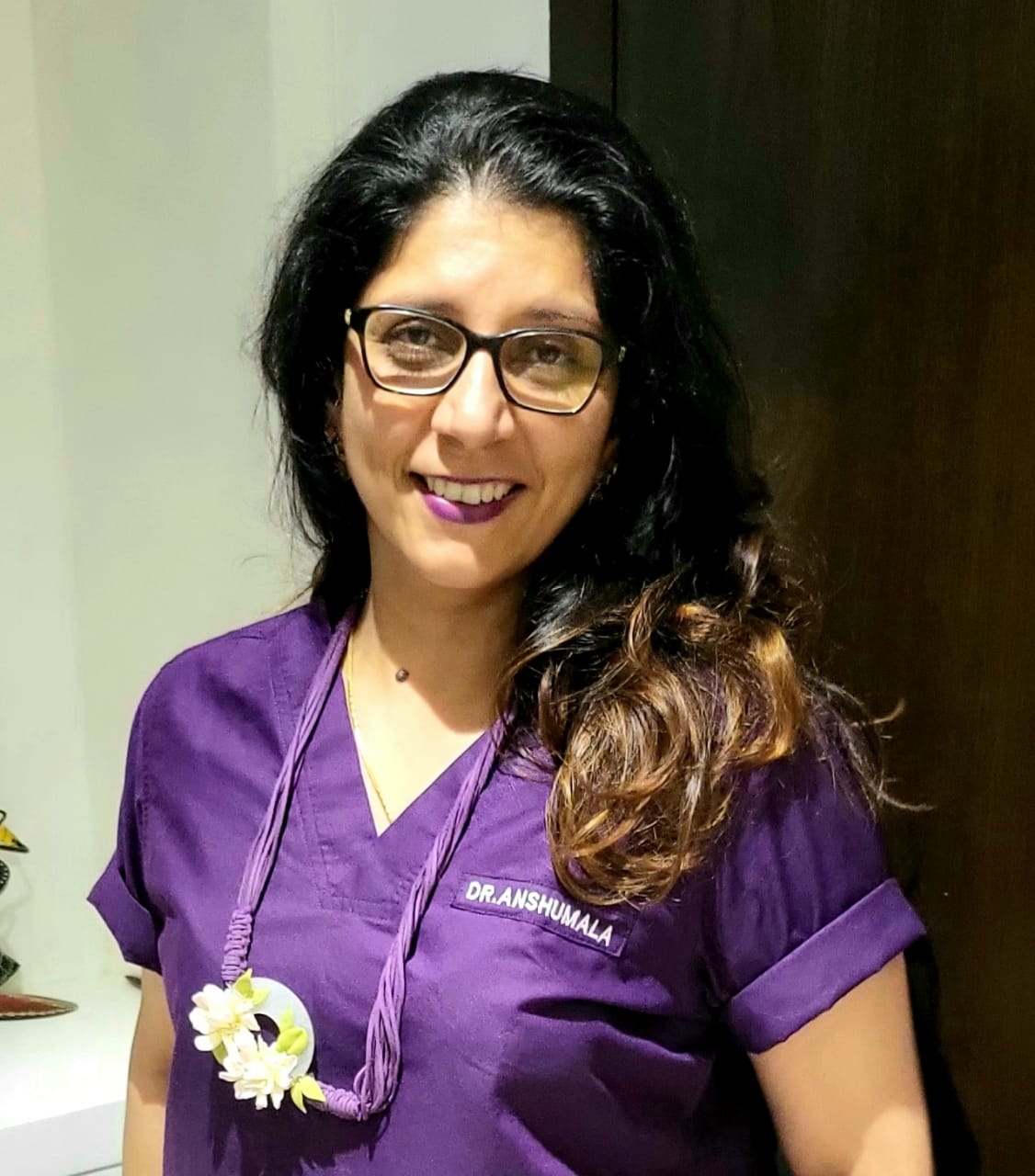Do you experience severe period pain, painful intercourse, or unexplained infertility? Does your menstrual cycle feel like a monthly battle with unbearable cramps and discomfort? If so, you might be dealing with endometriosis, a silent yet debilitating condition affecting millions of women worldwide. Many women dismiss their pain as “normal,” only to discover later that early diagnosis and expert treatment could have changed their lives. Collaborative research efforts are also focusing on reducing diagnostic delays and improving treatment strategies. Dr. Anshumala Kulkarni, a leading Laparoscopic & Robotic Surgeon in India, specializes in advanced endometriosis treatments, offering patients the best chance at recovery.

What is Endometriosis?
Endometriosis occurs when tissue similar to the uterine lining grows outside the uterus, leading to chronic pain, scarring, and adhesions. This misplaced tissue thickens, breaks down, and bleeds during menstruation but has no way to exit the body, causing inflammation and cyst formation. It commonly affects the ovaries, fallopian tubes, and pelvic lining, though in rare cases, it may spread to the bladder, intestines, or diaphragm. If left untreated, endometriosis can result in infertility and severe organ damage.
Why Does Endometriosis Happen?
The exact cause is unknown, but factors that contribute to the development of endometriosis include:
Retrograde Menstruation – Menstrual blood flows backward into the pelvic cavity.
Hormonal Imbalances – Excess estrogen levels can stimulate abnormal tissue growth.
Weakened Immune System – The body fails to eliminate misplaced endometrial cells, allowing them to grow and spread.
Genetic Factors – Women with a family history of endometriosis are at higher risk.
What are the Types of Endometriosis?
Endometriosis is classified into different types based on where the abnormal tissue grows.
Deep Endometriosis – The most severe form, where tissue penetrates deeper than 5 mm into affected organs, including the rectum and vagina.
Bladder Endometriosis – Growth of endometrial tissue inside or on the bladder, leading to frequent urination, pain, and blood in urine.
Bowel Endometriosis – Affects the bowel wall, causing painful bowel movements, bloating, and rectal bleeding.
Ovarian Endometriosis – Leads to the formation of chocolate cysts (endometriomas), which can interfere with ovulation and fertility.
Sciatic Nerve Endometriosis – A rare form where tissue grows around the sciatic nerve, causing intense leg pain and difficulty walking.
What Are the Unexpected Signs of Endometriosis?
Symptoms vary from person to person but commonly include:
Severe Menstrual Cramps – Pain may start before periods and last several days, spreading to the lower back and legs.
Pain During Intercourse – Many women experience deep pelvic pain during or after sex.
Painful Bowel Movements & Urination – Particularly during menstruation, leading to constipation or diarrhea.
Excessive Bleeding – Heavy periods or spotting between menstrual cycles.
Infertility – Endometriosis can cause tubal blockages, ovarian cysts, and uterine inflammation, reducing fertility.

How Does Endometriosis Progress Through Different Stages?
Symptoms vary from person to person but commonly include:
| Stage | Description | Symptoms |
| Stage 1 (Minimal) | Small adhesions and tiny tissue deposits on ovaries or pelvic area. | Mild or no symptoms, occasional discomfort. |
| Stage 2 (Mild) | More adhesions around ovaries and fallopian tubes, shallow lesions. | Mild pelvic pain, possible menstrual irregularities. |
| Stage 3 (Moderate) | Adhesions become more noticeable, ovarian cysts (endometriomas) develop. | Painful periods, heavy bleeding, painful intercourse, possible infertility. |
| Stage 4 (Severe) | Extensive adhesions, large cysts, and scar tissue formation. | Severe pelvic pain, digestive issues, infertility risk, organ fusion. |

When Should You See a Doctor?
If you experience chronic pelvic pain, irregular periods, or difficulty conceiving, consult a specialist immediately. Seeking treatment from the Best Doctor for Endometriosis in India can help prevent complications like organ damage and infertility. Dr. Anshumala Shukla-Kulkarni is an expert in diagnosing and treating all forms of endometriosis with advanced techniques.
What Are the Best Ways to Diagnose Endometriosis?
Doctors use several methods to diagnose endometriosis, including:
Pelvic Examination – To check for cysts, adhesions, and tenderness.
Ultrasound or MRI – Imaging tests to detect abnormal tissue growth in the reproductive organs.
Laparoscopy – A minimally invasive surgical procedure where a camera is inserted into the abdomen to diagnose and remove endometriosis lesions.
Biopsy – A small tissue sample is taken during laparoscopy to confirm the presence of endometrial-like cells.
Does Endometriosis Increase the Risk of Other Diseases?
Studies suggest a possible link between endometriosis and conditions like autoimmune diseases, cardiovascular issues, and even certain cancers. Regular medical check-ups and lifestyle management are essential for long-term health.
Can Endometriosis Spread to Other Parts of the Body?
In rare cases, endometriosis tissue has been found in unusual locations like the lungs, diaphragm, and even the brain. This condition, called extrapelvic endometriosis, can cause symptoms beyond the reproductive system.
Why Do Some Women with Endometriosis Have No Symptoms?
The severity of endometriosis doesn’t always match the level of pain. Some women with advanced stages may have no symptoms, while others with mild endometriosis can experience extreme discomfort, making diagnosis tricky.
Why Do Some Women with Endometriosis Have No Symptoms?
The severity of endometriosis doesn’t always match the level of pain. Some women with advanced stages may have no symptoms, while others with mild endometriosis can experience extreme discomfort, making diagnosis tricky.
Non-Surgical Treatments:
- Pain Management – NSAIDs like ibuprofen reduce inflammation and relieve pain.
- Hormonal Therapy – Birth control pills, GnRH agonists, and progestin help regulate hormonal activity and slow down endometrial growth.
- Lifestyle Modifications – A healthy diet, regular exercise, and stress management can help reduce symptoms.
Surgical Treatments:
-
Laparoscopic Excision Surgery – The gold standard for treating endometriosis by completely removing lesions.
-
Robotic-Assisted Surgery – A cutting-edge procedure that uses robotic technology for higher precision and faster recovery.
-
Hysterectomy – In severe cases, removal of the uterus and/or ovaries may be necessary if no other treatments work.
Can Endometriosis Be Treated Without Surgery?
Yes, non-surgical treatments like hormonal therapy, pain management, and dietary changes can help control symptoms. However, severe cases require surgical intervention for effective treatment.
Can Endometriosis Come Back After Surgery?
Yes, endometriosis can recur, but Laparoscopic Excision Surgery significantly reduces recurrence rates. Choosing the Best gynecologist for Endometriosis in India ensures long-term relief and successful management of the condition. Dr. Anshumala Shukla-Kulkarni, one of the Best Gynecologists in India, specializes in advanced laparoscopic and robotic surgeries, providing expert care for complex endometriosis cases.
Can You Get Pregnant If You Have Endometriosis?
Yes, it is possible to get pregnant with endometriosis, but it can be more challenging due to scar tissue, inflammation, and hormonal imbalances affecting fertility. Many women with mild to moderate endometriosis conceive naturally, while others may require medical assistance such as fertility treatments or surgery. In some cases, laparoscopic excision surgery can improve fertility outcomes by removing adhesions and cysts.
How Does Endometriosis Affect Pregnancy?
Endometriosis can increase the risk of pregnancy complications, including:
Higher risk of miscarriage due to hormonal imbalances and inflammation.
Preterm labor caused by uterine abnormalities or adhesions.
Increased chances of placenta previa, where the placenta blocks the cervix.
Severe pelvic pain during pregnancy, as the growing uterus puts pressure on adhesions and scar tissue.
Higher risk of C-section delivery due to complications with the uterus.
However, many women with endometriosis have healthy pregnancies with proper medical care.
What Are the Best Fertility Treatments for Women with Endometriosis?
If natural conception is difficult, several fertility treatments can help women with endometriosis:
Laparoscopic Surgery – Performed by the Best Doctor for Endometriosis in India, this procedure removes endometriosis tissue, improving fertility.
Ovulation Induction – Medications stimulate egg production for a higher chance of conception.
Intrauterine Insemination (IUI) – Sperm is placed directly into the uterus to increase the chances of fertilization.
In Vitro Fertilization (IVF) – The most effective option for severe endometriosis cases, IVF bypasses fallopian tube blockages and directly implants an embryo into the uterus.
Higher risk of C-section delivery due to complications with the uterus.
Dr. Anshumala Kulkarni specializes in treating infertility related to endometriosis, helping many women achieve successful pregnancies.
Does Endometriosis Increase the Risk of Miscarriage?
Studies suggest that women with endometriosis may have a higher risk of miscarriage, especially if they have severe inflammation, uterine abnormalities, or immune system dysfunction. Factors that may contribute to miscarriage include:
Hormonal imbalances that affect embryo implantation.
Poor egg quality due to ovarian endometriomas.
Inflammation of the uterine lining, making it harder for an embryo to develop.
Scar tissue or adhesions affecting the uterus’ ability to expand
Who is the Best Doctor for Endometriosis in India?
Finding the Best Doctor for Endometriosis in India is essential for successful treatment. Dr. Anshumala Shukla-Kulkarni is a leading specialist known for her expertise in Laparoscopic & Robotic Surgery for endometriosis.
Expert in Minimally Invasive Surgery – Specializes in laparoscopic and robotic excision surgery for complete removal of endometriosis lesions.
Extensive Experience – Has performed thousands of endometriosis surgeries with high success rates.
Personalized Treatment Plans – Customizes treatment based on severity, fertility goals, and patient needs.
Globally Recognized Specialist – Acknowledged as one of the top surgeons for endometriosis worldwide.
Advanced Medical Facilities – Equipped with state-of-the-art technology for precise and safe treatment.

For women who want to preserve their fertility, egg freezing (oocyte cryopreservation) may be an option before undergoing extensive treatment. Consulting a specialist like Dr. Anshumala Shukla-Kulkarni ensures a personalized approach to fertility preservation and pregnancy planning.
Endometriosis can pose challenges for pregnancy and fertility, but with the right medical care, many women successfully conceive and carry healthy pregnancies. The Best Doctor for Endometriosis in India, Dr. Anshumala Shukla-Kulkarni, specializes in advanced laparoscopic and robotic surgeries that improve fertility outcomes and manage endometriosis effectively. If you’re struggling with endometriosis-related infertility, get expert consultation today to explore the best treatment options for you.
